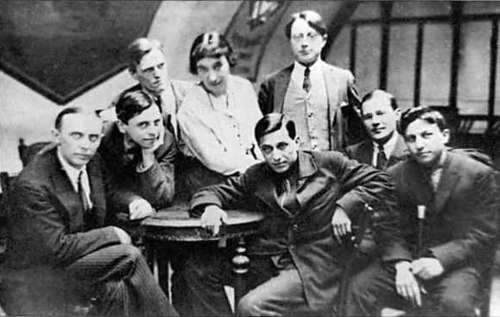Veniamin Kaverin
Veniamin Alexandrovich Kaverin (Russian: Вениамин Александрович Каверин; real name – Вениамин Абелевич Зильбер, or Veniamin Abelevich Zilber)[1](April 19 [O.S. April 6] 1902, Pskov – May 2, 1989, Moscow) was a Soviet writer associated with the early 1920s movement of the Serapion Brothers.
Veniamin Kaverin | |
|---|---|
 Serapion Brothers[1] Use a cursor to see who is who.
Kaverin is the one on the far right | |
| Born | Veniamin Alexandrovich Kaverin April 19, 1902 Pskov, Russia |
| Died | May 2, 1989 (aged 87) Moscow, Russia |
| Resting place | Vagankovo Cemetery, Moscow, Russia |
| Occupation | Writer, novelist |
| Language | Russian |
| Nationality | Russian |
| Literary movement | Serapion Brothers |
Biography
Kaverin was born in a family of kapellmeister of the 96th Infantry Regiment out of Omsk, Abel Abramovich Zilber and his wife Hana Girshevna Desson who owned a chain of music stores. His older sister, Leia Abelevna Zilber, married Yury Tynyanov who was a classmate of the Kaverin's older brother Lev Zilber.
Kaverin studied at the Pskov Governorate Gymnasium and in 1923 graduated the Leningrad Institute of Live Oriental Languages, specializing in Arabic. In 1924 he also graduated the history and philology faculty of the Leningrad State University. During that time was close with the OPOJAZ members. Kaverin also married the younger sister of Yury Tynyanov, Lidia and had two children Natalia and Nikolay.
During World War II evacuation in Yaroslavl, Kaverin completed his best-known novel, The Two Captains (1938–44), which colourfully recounts the adventures of Russian polar explorers before and after the Revolution. The book, awarded the Stalin Prize in 1946, was reissued 42 times in 25 years and was adapted for the screen twice, in 1955 and 1976. In 1966, Kaverin published a revised version of his 1929 study of Osip Senkovsky, Baron Brambeus. Later, he worked on his reminiscences about the literary milieu of the 1920s, which contained passages highly critical of Soviet policies in literature.
As The Moscow News commented on his centenary, "Kaverin showed that even under the worst of conditions it is possible to retain one's human qualities and decency. His example is a reproach to so many other Soviet writers who sold their souls to the regime and committed reprehensible public acts".[2]
Kaverin is buried at the Vagankovo Cemetery in Moscow.
English translations
- Open Book, Lawrence & Wishart, 1955.
- The Unknown Artist, Hyperion Press, 1973.
- Two Captains, Raduga Publishers, 1989.
- Two Captains, Fredonia Books, 2003.
References
- Google Books
- "English.mn.ru English.mn.ru". Archived from the original on March 13, 2006. Retrieved October 13, 2005.